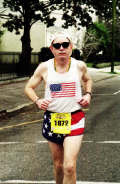Alouette (Little Skylark)
Singable English Translation[1]
Little skylark, lovely little skylark, little skylark, I'll
pluck your feathers off.
1. I'll pluck the
feathers off your head. I'll pluck the
feathers off your head off your head!
Little lark! Little lark! O-o-o-oh,
Little skylark, lovely little skylark, little skylark, I'll
pluck your feathers off.
2. I'll pluck the
feathers off your beak. I'll pluck the feathers off your beak!
Off your beak ! Off your beak !
Off your head! Off your head!
Little lark! Little lark! O-o-o-oh,
Little skylark, lovely little skylark, little skylark, I'll
pluck your feathers off.
3. I'll pluck the
feathers off your eyes. I'll pluck the feathers off your eyes.
Off your eyes! Off your eyes!
Off your beak! Off your beak !
Off your head! Off your head!
Little lark! Little lark! O-o-o-oh,
Little skylark, lovely little skylark, little skylark, I'll
pluck your feathers off.
4. I'll pluck the
feathers off your neck. I'll pluck the feathers off your neck
Off your neck! Off your neck!
Off your eyes! Off your eyes!
Off your beak! Off your beak !
Off your head! Off your head!
Little lark! Little lark! O-o-o-oh,
Little skylark, lovely little skylark, little skylark, I'll
pluck your feathers off.
5. I'll pluck the
feathers off your wings. I'll pluck the feathers off your wings.
Off your wings! Off your wings!
Off your neck! Off your neck!
Off your eyes! Off your eyes!
Off your beak! Off your beak !
Off your head! Off your head!
Little lark! Little lark! O-o-o-oh,
Little skylark, lovely little skylark, little skylark, I'll
pluck your feathers off.
6. I'll pluck the
feathers off your legs. I'll pluck the feathers off your legs
Off your legs! Off your legs!
Off your wings! Off your wings!
Off your neck! Off your neck!
Off your eyes! Off your eyes!
Off your beak! Off your beak !
Off your head! Off your head!
Little lark! Little lark! O-o-o-oh,
Little skylark, lovely little skylark, little skylark, I'll
pluck your feathers off.
7. I'll pluck the
feathers off your tail. I'll pluck the feathers off your tail.
Off your tail! Off your tail!
Off your legs! Off your legs!
Off your wings! Off your wings!
Off your neck! Off your neck!
Off your eyes! Off your eyes!
Off your beak! Off your beak !
Off your head! Off your head!
Little lark! Little lark! O-o-o-oh,
Little skylark, lovely little skylark, little skylark, I'll
pluck your feathers off.
Little skylark, lovely little skylark, little skylark, I'll
pluck your feathers off.
8. I'll pluck the
feathers off your back. I'll pluck the feathers off your back.
Off your back! Off your back!
Off your tail! Off your tail!
Off your legs! Off your legs!
Off your wings! Off your wings!
Off your neck! Off your neck!
Off your eyes! Off your eyes!
Off your beak! Off your beak !
Off your head! Off your head!
Little lark! Little lark! O-o-o-oh,
Little skylark, lovely little skylark, little skylark, I'll
pluck your feathers off.
[1] Alouette is a traditional French Canadian
Children’s song. As with most traditional songs, the composer is lost in antiquity.
In the original, the singer plucks not the feathers, but the body part itself.
It fits better my purpose, gentility and the flow of the poetry to use this copied
version as a base from which to work.

